- Home
- Kate DiCamillo
The Beatryce Prophecy
The Beatryce Prophecy Read online
Contents
BOOK THE FIRST
Chapter One
Chapter Two
Chapter Three
Chapter Four
Chapter Five
Chapter Six
Chapter Seven
Chapter Eight
Chapter Nine
Chapter Ten
Chapter Eleven
Chapter Twelve
BOOK THE SECOND
Chapter Thirteen
Chapter Fourteen
Chapter Fifteen
Chapter Sixteen
Chapter Seventeen
Chapter Eighteen
Chapter Nineteen
Chapter Twenty
Chapter Twenty-One
Chapter Twenty-Two
Chapter Twenty-Three
BOOK THE THIRD
Chapter Twenty-Four
Chapter Twenty-Five
Chapter Twenty-Six
Chapter Twenty-Seven
Chapter Twenty-Eight
Chapter Twenty-Nine
Chapter Thirty
Chapter Thirty-One
BOOK THE FOURTH
Chapter Thirty-Two
Chapter Thirty-Three
Chapter Thirty-Four
Chapter Thirty-Five
Chapter Thirty-Six
Chapter Thirty-Seven
Chapter Thirty-Eight
Chapter Thirty-Nine
Chapter Forty
Chapter Forty-One
Chapter Forty-Two
BOOK THE FIFTH
Chapter Forty-Three
Chapter Forty-Four
Chapter Forty-Five
Chapter Forty-Six
Chapter Forty-Seven
Chapter Forty-Eight
Chapter Forty-Nine
Chapter Fifty
Chapter Fifty-One
Chapter Fifty-Two
Chapter Fifty-Three
Chapter Fifty-Four
BOOK THE LAST
Answelica was a goat with teeth that were the mirror of her soul—large, sharp, and uncompromising.
One of the goat’s favorite games was to lull the monks of the Order of the Chronicles of Sorrowing into a sense of complacency by arranging her features in a benign and indifferent expression.
For weeks, she would bite no one.
When approached, she would merely stare into the distance as if she were considering something profound. And then, when the brothers had relaxed their guard, thinking that perhaps, somehow, Answelica had changed, the goat would come from behind and butt them in the backside as hard as she was able.
She was very strong, and she had a very hard head. Because of this, the goat was able to send the monks flying great distances through the air.
When they landed, she bit them.
She was a goat who formed peculiar and inexplicable antipathies, taking an intense dislike to certain individuals. She would stalk a particular brother, waiting for him in the purple shadow of a building, and then she would leap out and make an unholy noise that sounded like the scream of a demon.
The monk—terrified, undone—would scream, too.
The monk and the goat would then engage in a duet of screaming until the goat was satisfied and trotted away looking beatific, leaving behind her a trembling, weeping monk.
The brothers of the Order of the Chronicles of Sorrowing would have liked to butcher her, but they were afraid of the ghost of Answelica.
The monks agreed among themselves that the ghost of the goat would surely be more vicious and determined, more impossible to outwit, than the flesh-and-blood goat.
How would she seek her revenge from the afterworld?
It beggared the imagination to consider what the ghost goat would do.
And so she lived.
Which is just as well.
Which is, in fact, wonderful.
Because without the goat, Beatryce surely would have died.
And then where would we be?
All of this took place during a time of war.
Sadly, this does not distinguish it from any other time; it was always a time of war.
Brother Edik was the one who found her.
The world that morning was coated in a layer of hoarfrost, and the brother was late to the task of feeding Answelica because he had stood for too long admiring the light of the rising sun shining on the blades of grass and the branches of the trees.
The whole world seemed lit from within.
“Surely, it is evidence of something,” Brother Edik said aloud. “Surely, such beauty means something.”
He stood and looked at the world until the cold made his hands ache and he came at last to his senses.
He trembled as he entered the barn, certain that Answelica—displeased at his lateness—was already plotting against him. But he was surprised to find the goat asleep, her legs folded beneath her, her back to him.
What new ploy was this?
Brother Edik cleared his throat. He put down the bucket. Still, the goat did not move. He stepped closer. He gasped.
His mind was playing tricks on him.
Or rather it was his eye playing tricks—his left eye, which would not stay quiet and still, but rolled around in his head, looking for something it had yet to find.
“Some demon occupies that eye,” Brother Edik’s father had said, “and that demon has made its way into your mind as well.”
And now, in the early-morning gloom of the barn, Brother Edik’s wandering eye, his strange mind, was seeing a goat with two heads.
“Have mercy upon us,” whispered Brother Edik.
Answelica with one head was already more than the brothers could bear. How could they live with the goat if she had two heads and two sets of teeth?
She would upend the order of the universe. She would put the king from his castle. Answelica with two heads would be a creature capable of ruling the world.
The brother took a tentative step forward. He squinted and saw that the other head belonged to a child curled up beside the goat.
Brother Edik let out a sigh of relief.
And then a new wave of terror engulfed him when he realized that the child had hold of one of the goat’s ears.
A child. Next to the goat.
A child curled up and holding on to the demon Answelica!
Brother Edik’s heart thumped with dread. The goat’s terrible teeth flashed through his mind. He knew those teeth more intimately than he would wish.
On a summer day the year before, Brother Edik had spent what seemed an eternity being chased by Answelica through a flower-studded meadow.
What the goat was doing in this meadow, miles from the monastery, close to the castle of the king, was a mystery that Brother Edik had never solved.
Brother Edik should not have been there himself. It was only that a traveler had told him of the flowers in the field, of their glory and profusion, and Brother Edik thought that he must see this beauty for himself.
In the meadow, the goat had come up behind him, silently, stealthily. She breathed her terrible breath upon his backside; then she gave him a gentle, almost playful, butt with her head.
Brother Edik began to run.
He ran, and the goat followed him. The two of them ran together through the field of flowers. And when, at last and inevitably, Brother Edik tripped and fell, Answelica came up to him and stood with one cloven hoof on his chest, looked deep into his eyes, and opened and closed her mouth.
She drooled on him.
She gave him a good amount of time, another eternity, to consider her teeth in every particular, and to consider, too, the atrocities of which he knew them to be capable.
Just when Brother Edik thought that he could bear it no more, the goat presse
d her hoof down upon him very, very hard, then lifted it and walked away from him.
He bore the mark of that afternoon still—the sullen partial outline of a goat’s hoof on his chest. The mark would stay there for the rest of his life, a red arrow pointing to his heart.
As if anyone would need help locating Brother Edik’s heart!
“Here,” he said now. He took a step closer to the goat. “We must be very careful.”
The goat ignored him. The small form nestled up against the goat did not stir. Brother Edik saw that the child’s feet were bare and covered in blood.
He shivered. Should he go and get help?
“You coward,” he heard his father say. “You broken-eyed coward.”
And it was true. He was a coward.
But still, he could not walk away and leave this child alone with Answelica. He would have to confront the goat.
“You goat-fearing fool,” he heard his father say.
Brother Edik sighed.
He wished his father’s voice would leave him alone. He wished it could be silenced once and for all.
Brother Edik gathered his robe and made to climb over the gate and into the goat’s domain.
Answelica stood. She emitted a high-pitched noise.
The child sat up, and Brother Edik saw long hair, astonished eyes, a face shaped like a heart.
A girl child.
She was crying.
It was not outraged crying or sorrowful crying. It was the crying of someone who was tired beyond all reckoning, the crying of someone who was trying very hard not to cry.
Tears rolled down her face as she looked into his eyes, both of them—his steady eye and his wild and wandering eye—and did not look away.
Brother Edik looked back at her. He felt his heart shift inside of him.
He felt it open.
“Oh,” said Brother Edik.
Answelica let out another high-pitched noise.
“Shhh,” said Brother Edik to the goat and the girl. “Shhhh. All will be well. All will be well.”
And yet, even as Brother Edik spoke those words, other words, more ominous words, were being spoken not far away.
In the drafty throne room of the king’s castle, a soldier bowed before the king and said, “Sire, the woman is secured in the dungeon, as you commanded. But I must tell you that the child is missing. I have searched all of Castle Abelard and its environs. I could not find her.”
“What do you mean you could not find her?” said the king.
“I mean, sire, that she is not there. Her body was not there. The girl is gone.”
Answelica stood next to the child in a ferocious, protective pose.
Brother Edik had one leg swung over the gate and one leg still on the ground.
“Please,” he said to the goat.
Answelica looked at him, and then she turned and looked at the child, and then she looked back at him. In the dim barn, it was hard to gauge subtleties of emotion, particularly in the eyes of a being who had seldom before evidenced subtleties of any sort, but Brother Edik thought he recognized the flicker in the goat’s eye. It was both a light of affection for the child and a light of warning for him.
The goat lowered her head in a threatening gesture.
“It is cold,” said Brother Edik from atop the gate. “It is very cold. Too cold for a child. I mean her no harm. I only want to help.”
The goat and the monk stared at each other. Meanwhile, the child quietly cried.
Outside, the sun rose higher and higher. A wedge of light entered the barn—golden and warm. Dust motes danced in the air.
Beauty, again.
“Let me in,” said Brother Edik to the goat. He spoke softly. “You must let me tend to her.”
Answelica took one step back.
For what was surely the first time in her life, she retreated.
Brother Edik swung his other leg over the gate. He stepped into the goat’s enclosure.
“Are you injured?” he asked the child.
She was young. Not more than ten years old, although it was impossible to tell for certain, dirt- and blood-encrusted as she was.
The girl did not answer him.
“What is your name?” asked Brother Edik.
Tears continued to roll down her cheeks, clearing a path through the dirt.
Brother Edik took a step toward her. Answelica growled. You would not think a goat could growl, but this goat was forever full of surprises.
“Will you let me carry you?” Brother Edik asked.
Again, the child did not answer. Perhaps she could not speak?
Answelica glared at him. She lowered her head. She offered her ear, and the girl took hold of it. The goat stood quietly, head bowed.
“I am going to carry you,” said Brother Edik. And then he announced his intentions to the goat: “I am going to carry her.”
The child let go of Answelica’s ear.
Brother Edik bent and gathered her in his arms. Her skin was hot to the touch. She was burning with fever.
“She is very sick,” Brother Edik said to the goat, who was staring up at him. “The first thing we must attempt to do is to bring the fever down. And we must wash her. We must remove the dirt and blood. She has come from some war, I suppose. Do you not think it so?”
Answelica nodded.
Lord help me, thought Brother Edik. I am conferring with a goat.
He walked out of the barn and into the light of day carrying the child. The frost had melted. The world no longer shone, but it was very bright.
Answelica was at his heels.
He turned and looked back at her. He saw that the goat’s eyes were gentle, full of concern.
Strange world! Impossible world!
Brother Edik felt his heart, light within him, almost as if it were filled with air.
Answelica butted her head against his legs. It was not a warning, but a request: “Go faster. Please hurry. Tend to the child.”
Oh, this strange world.
The sun was warm on Brother Edik’s face.
This impossible world.
She dreamed.
The tutor held something in his hand, curled in his fist. “It is for Beatryce,” he said.
“What is it?” shouted her brothers. “Let us see, let us see!”
“Tap my hand,” the tutor told her.
She touched his fingers, and he uncurled them slowly to reveal a strange creature.
“What is it?” she said.
“A seahorse,” he said. “A horse of the sea.”
“Does it live?” she asked.
“It is dead,” the tutor answered her.
She took the seahorse from his hand. It was light, so light that it felt as if she were holding someone else’s dream cupped in her hand.
She admired the seahorse’s curled tail, considered his long nose. She turned him over and saw that he had only one eye.
“Is he made so?” she asked. “With only one eye?”
“No,” said the tutor. “Some trauma happened, I suppose.”
“It’s broken!” shouted Asop.
“I want to hold it,” said Rowan.
“In a moment,” said Beatryce.
Rowan jostled her elbow, and the seahorse fell from her hand.
This happened slowly, so slowly that it seemed as if the seahorse floated through the air, twisting and turning, his one eye appearing and then disappearing—winking at her.
And then there came a flash of light.
A soldier burst into the hall.
The seahorse never reached the ground.
The dream ended before he could complete his fall, and then it began again: the tutor’s closed fist, the tutor’s long fingers uncurling to reveal the creature, his voice saying, “A seahorse. A horse of the sea.”
Then came the word dead and the lightness, the weightlessness, of the seahorse in her hand, the creature falling and falling, the soldier bursting in.
The dream repeated. It re
peated and never changed.
The seahorse, it seemed, would never do anything but fall.
Beatryce, caught in her fever, captured by her dream, turned from side to side, working to escape.
She sat up and cried out.
Someone put a hand to her forehead.
There was a snuffling sound, warm breath.
She reached out and found the comfort of a densely furred ear.
I must hold on to this, she thought. There is nothing else to do but to hold on to this.
And then she was asleep again, delivered back to the dream, delivered back to the tutor’s slowly opening fist and to the seahorse falling, falling, falling.
Brother Edik’s task in the Order of the Chronicles of Sorrowing was to illuminate. He made glorious golden letters that began the text of each page of the Chronicles.
It was both a relief and a joy to him to make the letters match the world as he so often saw it: brilliant, luminous. He went to sleep at night with the letters glowing in his mind and woke with them there, too—elegant, intricately formed shapes that shone and shone.
Sometimes, as he worked, the letters revealed some truth to him—a line of prophecy that would repeat in his head until he knew it to be true.
He would then go to Father Caddis and say, “These words were delivered to me as I worked.”
Father Caddis would nod and solemnly write the prophecy down so that it could be entered into the great book, and then he would stand and put his hand on Brother Edik’s head and speak the words that had been said to all the many prophets of the Order of the Chronicles of Sorrowing who had preceded Brother Edik: “I thank you for your vision. These words will be recorded.”
And after, as Brother Edik went through his day, the objects of the world itself glowed—the bowl on the table, the flowers in the field, the hoe propped against the side of the barn.
This glowing must be the product of his wayward, broken eye—his crooked, strange mind. Or that, at least, was the explanation his father would have given.
Whatever the reason, Brother Edik saw beauty everywhere. He painted that beauty into his letters; he listened for the words of truth.
He wished, often, that his letters illuminated a manuscript less grim, less full of beheadings and treachery and war and prophecies of doom and suffering.
Brother Edik was very sick, supremely sick, of war and violence.

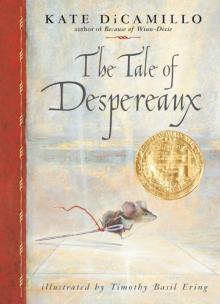 The Tale of Despereaux
The Tale of Despereaux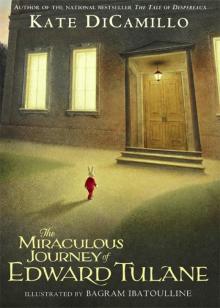 The Miraculous Journey of Edward Tulane
The Miraculous Journey of Edward Tulane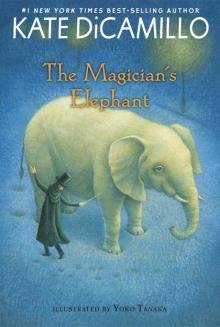 The Magician's Elephant
The Magician's Elephant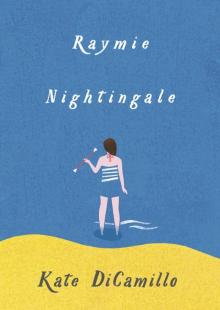 Raymie Nightingale
Raymie Nightingale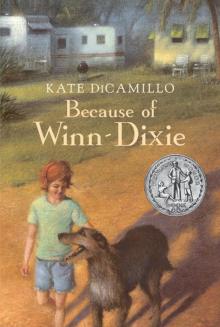 Because of Winn-Dixie
Because of Winn-Dixie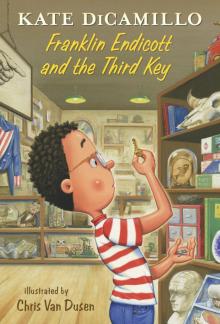 Franklin Endicott and the Third Key
Franklin Endicott and the Third Key Francine Poulet Meets the Ghost Raccoon
Francine Poulet Meets the Ghost Raccoon Where Are You Going, Baby Lincoln?
Where Are You Going, Baby Lincoln? Flora & Ulysses: The Illuminated Adventures
Flora & Ulysses: The Illuminated Adventures Beverly, Right Here
Beverly, Right Here Eugenia Lincoln and the Unexpected Package
Eugenia Lincoln and the Unexpected Package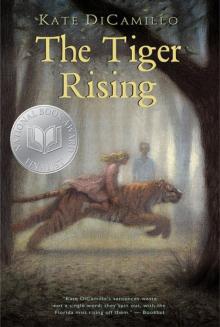 The Tiger Rising
The Tiger Rising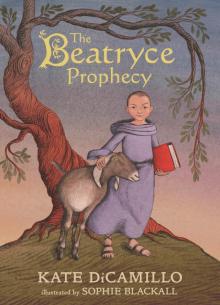 The Beatryce Prophecy
The Beatryce Prophecy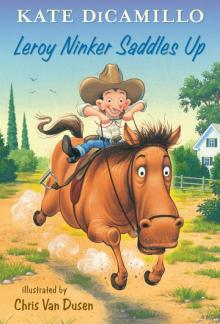 Leroy Ninker Saddles Up
Leroy Ninker Saddles Up